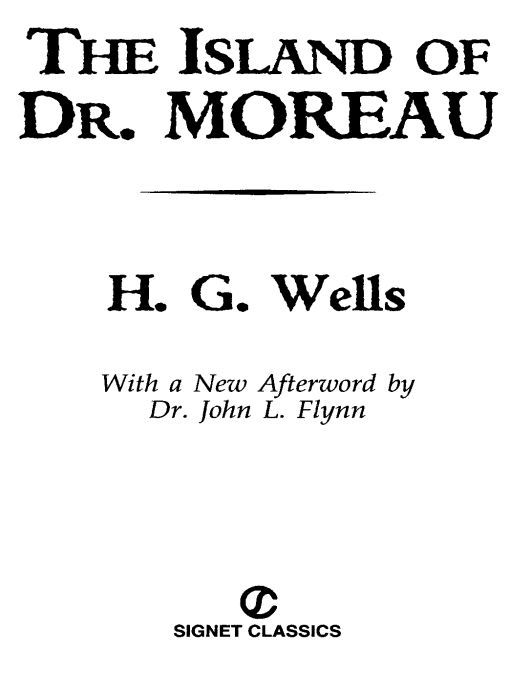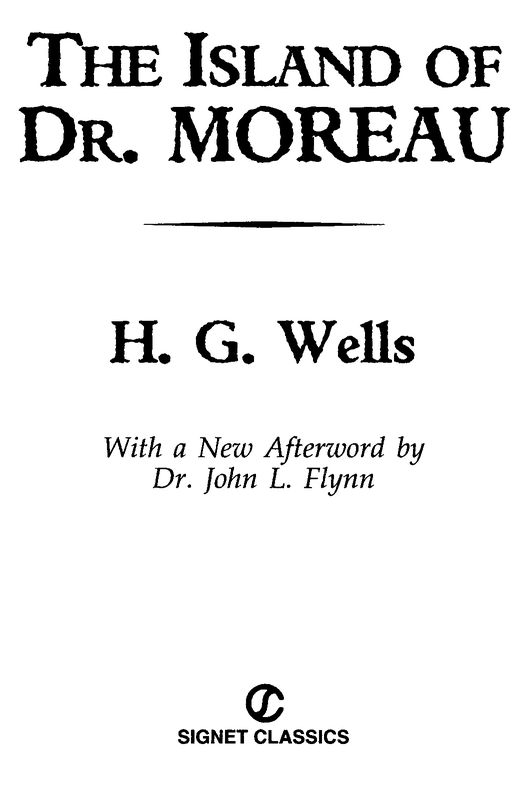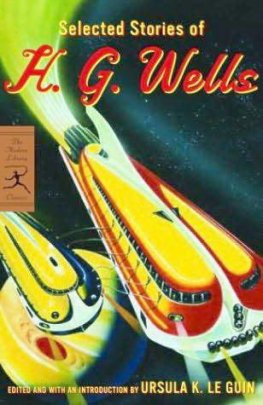Table of Contents
Herbert George Wells (1866-1946) left school at thirteen to become a drapers apprentice (a life he detested); he later won a scholarship to the Normal School of Science in London, where he studied with the famous T. H. Huxley. He began to sell articles and short stories regularly in 1893. His immediately successful novel The Time Machine (1895) rescued him from poverty. His other scientific romancesThe Island of Dr. Moreau (1896), The Invisible Man (1897), The War of the Worlds (1898), and The First Men in the Moon (1901)made him the father of science fiction.
Dr. John L. Flynn is a three-time Hugo-nominated author and longtime science fiction fan and critic who has written seven books, numerous short stories, articles, reviews, and a screenplay. A professor at Towson University in Towson, Maryland, he teaches both graduate and undergraduate writing courses, including a course on Writing Science Fiction. He holds two Ph.D.s, in literature and psychology.
INTRODUCTION
On February the 1st, 1887, the Lady Vain was lost by collision with a derelict when about the latitude 1 s. and longitude 107 E.
On January the 5th, 1888that is, eleven months and four days aftermy uncle, Edward Prendick, a private gentleman, who certainly went aboard the Lady Vain at Callao, and who had been considered drowned, was picked up in latitude 53 s. and longitude 101 E. in a small open boat, of which the name was illegible, but which is supposed to have belonged to the missing schooner Ipecacuanha. He gave such a strange account of himself that he was supposed demented. Subsequently, he alleged that his mind was a blank from the moment of his escape from the Lady Vain. His case was discussed among psychologists at the time as a curious instance of the lapse of memory consequent upon physical and mental stress. The following narrative was found among his papers by the undersigned, his nephew and heir, but unaccompanied by any definite request for publication.
The only island known to exist in the region in which my uncle was picked up is Nobles Isle, a small volcanic islet, and uninhabited. It was visited in 1891 by H.M.S. Scorpion. A party of sailors then landed, but found nothing living thereon except certain curious white moths, some hogs and rabbits, and some rather peculiar rats. No specimen was secured of these. So that this narrative is without confirmation in its most essential particular. With that understood, there seems no harm in putting this strange story before the pubic, in accordance, as I believe, with my uncles intentions. There is at least this much in its behalf: my uncle passed out of human knowledge about 5 s. and longitude 105 E., and reappeared in the same part of the ocean after a space of eleven months. In some way he must have lived during the interval. And it seems that a schooner called the Ipecacuanha, with a drunken captain, John Davis, did start from Africa with a puma and certain other animals aboard in January 1887, that the vessel was well known at several ports in the South Pacific, and that it finally disappeared from those seas (with a considerable amount of copra aboard), sailing to its unknown fate from Banya in December 1887, a date that tallies entirely with my uncles story.
CHARLES EDWARD PRENDICK
CHAPTER 1
In the Dinghy of the Lady Vain
I do not propose to add anything to what has already been written concerning the loss of the Lady Vain. As everyone knows, she collided with a derelict when ten days out from Callao. The longboat with seven of the crew was picked up eighteen days after by H.M. gunboat Myrtle, and the story of their privations has become almost as well known as the far more terrible Medusa case. I have now, however, to add to the published story of the Lady Vain another as horrible, and certainly far stranger. It has hitherto been supposed that the four men who were in the dinghy perished, but this is incorrect. I have the best evidence for this assertionI am one of the four men.
But, in the first place, I must state that there never were four men in the dinghy; the number was three. Constans, who was seen by the captain to jump into the gig (Daily News, March 17, 1887), luckily for us, and unluckily for himself, did not reach us. He came down out of the tangle of ropes under the stays of the smashed bowsprit; some small rope caught his heel as he let go, and he hung for a moment head downward, and then fell and struck a block or spar floating in the water. We pulled towards him, but he never came up.
I say, luckily for us he did not reach us, and I might almost add luckily for himself, for there were only a small beaker of water and some soddened ships biscuits with usso sudden had been the alarm, so unprepared the ship for any disaster. We thought the people on the launch would be better provisioned (though it seems they were not), and we tried to hail them. They could not have heard us, and the next morning when the drizzle clearedwhich was not until past middaywe could see nothing of them. We could not stand up to look about us because of the pitching of the boat. The sea ran in great rollers, and we had much ado to keep the boats head to them. The two other men who had escaped so far with me were a man named Helmar, a passenger like myself, and a seaman whose name I dont know, a short sturdy man with a stammer.
We driftedfamishing, and, after our water had come to an end, tormented by an intolerable thirst, for eight days altogether. After the second day the sea subsided slowly to a glassy calm. It is quite impossible for the ordinary reader to imagine those eight days. He has notluckily for himselfanything in his memory to imagine with. After the first day we said little to one another and lay in our places in the boat and stared at the horizon, or watched, with eyes that grew larger and more haggard every day, the misery and weakness gaining upon our companions. The sun became pitiless. The water ended on the fourth day, and we were already thinking strange things and saying them with our eyes; but it was, I think, the sixth before Helmar gave voice to the thing we all had in mind. I remember our voicesdry and thin, so that we bent towards one another and spared our words. I stood out against it with all my might, was rather for scuttling the boat and perishing together among the sharks that followed us; but when Helmar said that if his proposal was accepted we should have drink, the sailor came round to him.
I would not draw lots, however, and in the night the sailor whispered to Helmar again and again, and I sat in the bows with my clasp-knife in my handthough I doubt if I had the stuff in me to fight. And in the morning I agreed to Helmars proposal, and we handed halfpence to find the odd man.
The lot fell upon the sailor, but he was the strongest of us and would not abide by it, and attacked Helmar with his hands. They grappled together and almost stood up. I crawled along the boat to them, intending to help Helmar by grasping the sailors leg, but the sailor stumbled with the swaying of the boat, and the two fell upon the gunwale and rolled overboard together. They sank like stones. I remember laughing at that and wondering why I laughed. The laugh caught me suddenly like a thing from without.













